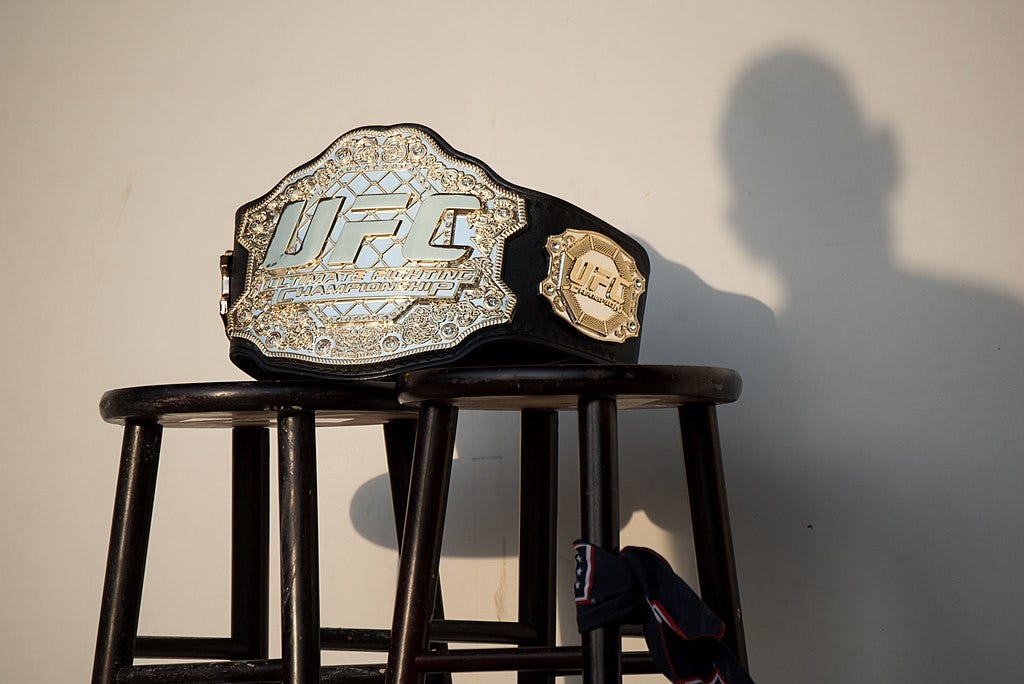Saudi sports ambitions could expand with UFC-WWE merger
The WWE plans to continue its controversial partnership with Saudi Arabia. But the merger opens up newfound opportunities between the kingdom and the UFC.
There was a time when Ari Emanuel—the CEO of entertainment and media powerhouse Endeavor—was walking around with bodyguards in fear for his life.
It was October 2018 and the Hollywood superagent had privately informed Saudi Arabia’s state-run Public Investment Fund (PIF) that he planned to return their $400 million investment in his company, effectively putting an end to the talent agency’s relationship with the kingdom.
Emanuel, who had once helped throw a lavish Hollywood party for Crown Prince Mohammed bin Salman during his visit to the United States, took the decision in protest of the Saudi government’s murder and dismemberment of dissident journalist Jamal Khashoggi. Fearing Saudi’s reaction to his decision, he began to travel with bodyguards.
Emanuel’s decision made him an outlier among his peers. While countless companies pledged to sever ties with Saudi Arabia following Khashoggi’s killing, almost none followed through.
Now it appears that even Emanuel is back in the Saudi business.
On Monday, Endeavor announced it had purchased a controlling stake in World Wrestling Entertainment (WWE) and planned to merge the company with the Ultimate Fighting Championship (UFC) to create a $21 billion sports entertainment conglomerate.
Emanuel, who purchased the UFC in 2016 for $4 billion, will lead the new company, while Vince McMahon—fresh from a sexual misconduct investigation—will continue to serve as the executive chairman at WWE.
Among the many questions raised by the newfound merger was whether the WWE would be allowed to maintain its lucrative 10-year partnership with the kingdom given its history with Emanuel—a partnership that earns the WWE approximately $50 million for each event held in Saudi Arabia.
Speaking with Axios earlier this week, WWE President Nick Khan confirmed that the company’s relationship with the controversial kingdom will remain in place, adding that the organization was “excited” to move forward with the long-term partnership.
"Our relationship with the kingdom is a terrific partnership for which we're appreciative of and…nothing in terms of anyone else's prior experience will affect that,” Khan said in reference to Emanuel. “We think that we've delivered the product in the way that the kingdom wanted it delivered. We have a multiple year agreement with them in place. We're excited to do a show. We'll be back there May 27 for a big premium live event.“
Over the past few years, Saudi Arabia has spent billions on high-profile international sports and entertainment events. The strategic investment is part of the kingdom’s ‘Vision 2030’ masterplan that aims to reduce Saudi’s economic dependence on oil but it also serves to distract from ongoing human rights abuses committed by the kingdom with impunity, as well its ongoing war in Yemen that has resulted in a humanitarian crisis among the worst in the world.
The kingdom’s sports portfolio includes an annual Formula 1 Grand Prix, the world’s richest horse race, massive investments in esports and gaming and a professional golf tour with ambitions to rival the PGA tour. The kingdom’s investment fund also financed the purchase of English Premier League team Newcastle United, and was even reportedly in the running to purchase the WWE before the merger was finalized.
As it stands, the WWE holds two shows each year in Saudi Arabia. Part of the purpose for these events, much like Saudi Arabia’s other sports and entertainment investments, is to attract attention to the kingdom and present it as a reformed sports and entertainment hub.
This facade of progress was particularly evident when the WWE began holding events with female talent, who had previously been unable to perform in Saudi Arabia until 2019. While the organization presented the change as evidence of the kingdom’s reforms, Saudi Arabia has continued to repress human rights and target women’s rights activists and movements.
In August 2022, Salma al-Shehab, a Saudi student at Leeds University, was given a 34-year prison sentence for using Twitter to follow and retweet dissidents and activists. Al-Shehab is a mother of two young children and was not known as a vocal activist inside the kingdom. She had about 2000 followers on Twitter and was initially expected to serve a three-year sentence. However, an appeals court Monday imposed a sentence of 34 years in prison followed by a 34-year travel ban.
Later that same month, another Saudi woman was handed a 45-year prison sentence for “using the internet to tear the social fabric” and “violating public order by using social media.” The draconian sentencing emphasizes the kingdom’s continued oppression of female dissidents despite claims of reform and progress.
Apart from continuing to reap the economic and sportswashing benefits from hosting WWE events, it is possible that the new merger paves the way for the UFC to host its first event in Saudi Arabia.
The UFC has already established a presence in the Gulf region through a long-term partnership with the Abu Dhabi Department of Culture and Tourism. Since then, the UFC has held 14 events in Abu Dhabi, including several consecutive shows on Yas Island during the Covid-19 pandemic.
The advantage of hosting events in Abu Dhabi is that the local government pays a hosting fee and floats the bill for the UFC’s expenses. This would likely be the case if the UFC ventures to Saudi Arabia in the foreseeable future.
This also fits Endeavor’s cost efficiency approach when it comes to operating the UFC. Endeavor reportedly cut $70 million from UFC’s operating costs in the first 18 months and has since led the promotion to several record-breaking revenue years. Less than 16 percent of that total revenue was split with UFC fighters.
While it remains to be seen how much the merger will change how the UFC and WWE operate, it seems as though Emanuel is willing to let bygones be bygones when it comes to Saudi Arabia and potential billion-dollar deals.



